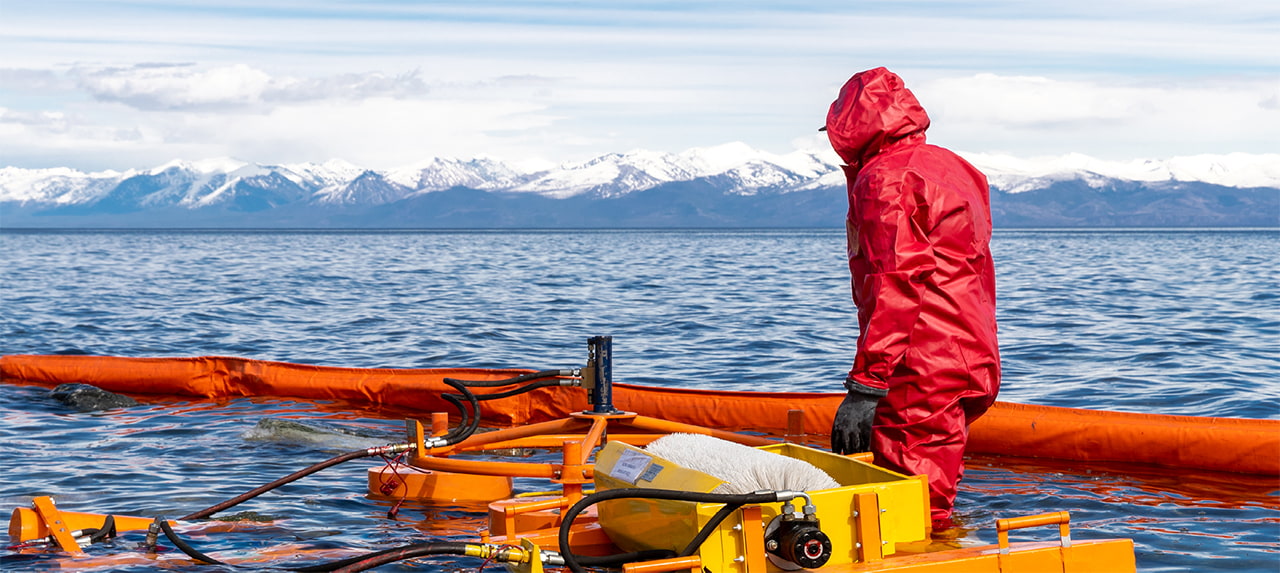Environmental Strategy

The Environmental Strategy through 2030 with an outlook through 2035 seeks to minimise the environmental impact from Russian Railways’ operations, ensure sustainable use of natural resources and enhance environmental safety.
Environmental Strategy targetsThe baseline year is 2019 as it came before the COVID-19 pandemic and was representative in terms of the key economic and environmental performance metrics. Change in targets is with reference to the 2019 level.
The Environmental Strategy provides for a conservative and innovative scenario, depending on which the targets will be met. Under the conservative scenario up to 2035, the Company's transportation volumes will grow at a relatively low average annual rate (+0.8%), while the innovative scenario assumes growth at a higher rate (+2%).

Key environmental initiatives in 2023
- Russian Railways’ Methodology for GHG Emissions Volume Measurement developed and approvedRussian Railways’ Order No. 726/r dated 24 March 2023 On Approval of the Comprehensive Methodology for GHG Emissions Volume Measurement at Russian Railways..
- Sources of Russian Railways’ GHG emissions assessed.
- Report on Russian Railways’ GHG emissions filed.
- Report on Direct GHG Emissions Associated with Russian Railways’ Operations within the Far Eastern Railway in the Sakhalin Region in 2022 verified.
- 611 modern traction rolling stock units with improved environmental performance purchased.
- Nine units with accumulated environmental damage fully eliminated.
- 2,613 capacitors containing polychlorinated biphenyls (135 t) eliminated at a specialised landfill in Shikhany, Saratov Region, for the first time in the country.
- Two units launched to process industrial rubber waste products (at the Reshetnikovo and Smolensk stations).
- 40 boilers transitioned to alternative heat supply sources, including 33 shifting from coal to electric heating, six from fuel oil to natural gas, and one from diesel fuel to electricity.
- Development of a chain of reverse vending machines underway (216 machines at 158 railway stations), with 1.5 million used cans and plastic bottles collected and transferred for further recycling.
- Development of Russian Railways’ Production and Consumption Waste Management Framework started together with the Research Institute for Digitalisation, Automation and Telecommunications the Railway Industry, relying on the principles of circular economy.
- Requirements for container sites for temporary collection of municipal solid waste and secondary materials approved.
- Diploma in the Environmental Responsibility category of All‑Russia Environmental Leader Award 2023
- No. 1 in the Best Eco‑Tourism ProjectA project by the multiple unit train depot Otrozhka, South-Eastern Directorate of Multiple Unit Trains., the Best Project in Efficient Municipal Solid Waste ManagementA project by the Zavitinskaya Mechanised Infrastructure Maintenance Division (part of Eastern Directorate of Work Train Operation — Directorate of Work Train Operation — Central Directorate of Infrastructure, a branch of Russian Railways). and the Best Project in Mitigating the Adverse Impact of Industrial Facilities, Housing and Utilities on Water BodiesA project by the Sverdlovskaya Railway, a branch of Russian Railways. categories of Reliable Partner – Environment, a national contest of the best regional environmental practices, in 2023
- No. 1 in the Best Environmental and Technosphere Safety Manager category of HSE TOP 100, a national contest of HSE leaders
- Winning awards in the Environmental Culture. Peace and Harmony international competition, held under the auspices of the Vernadsky Non‑Governmental Environmental Foundation, in 2023:
- in the Sustainable Business category, with the “Reverse Vending Machines at Russia's Railway Stations” project implemented by the Railway Stations Directorate, a branch of Russian Railways;
- in the Environmental Awareness category, with the “Unveiling Baikal: A Projects and Research School” initiative implemented by General Education and Boarding School No. 21, a private educational institution run by Russian Railways;
- in the Ecotourism category, with the “Ecological Tourism on the Gorky Railway” project implemented by the Gorky Railway, a branch of Russian Railways;
- Recognition of the North Caucasus and Sverdlovskaya railways by the Vernadsky Non‑Governmental Environmental Foundation as the most active contributors to the Green Spring 2023 clean‑up initiative.
 A project to upgrade the locomotive depot treatment facilities at the Yekaterinburg‑Sortirovochny station secured our award at Reliable Partner – Environment, a national contest of the best regional environmental practices. It was acclaimed to be the best project in mitigating the anthropogenic impact of industrial facilities, housing and utilities on water bodies in 2023. The state‑of‑the‑art modular unit assembled in December 2022 and launched in early 2023 is used for efficient automatic multistage treatment and filtration of industrial effluents fed into the municipal sewage system. The innovative equipment was an essential addition to the existing comprehensive treatment system for wastewater and storm water at the Yekaterinburg‑Sortirovochny station.Eduard Ryabukhin, Head of the Environmental Protection Centre at Russian Railways’ Sverdlovskaya Railway
A project to upgrade the locomotive depot treatment facilities at the Yekaterinburg‑Sortirovochny station secured our award at Reliable Partner – Environment, a national contest of the best regional environmental practices. It was acclaimed to be the best project in mitigating the anthropogenic impact of industrial facilities, housing and utilities on water bodies in 2023. The state‑of‑the‑art modular unit assembled in December 2022 and launched in early 2023 is used for efficient automatic multistage treatment and filtration of industrial effluents fed into the municipal sewage system. The innovative equipment was an essential addition to the existing comprehensive treatment system for wastewater and storm water at the Yekaterinburg‑Sortirovochny station.Eduard Ryabukhin, Head of the Environmental Protection Centre at Russian Railways’ Sverdlovskaya Railway
Russian Railways became the first company in Russia to safely dispose of electrical equipment containing oils with polychlorinated biphenyls (PCBs). In 2023, the first batch of such waste was neutralised using an environmentally safe method. The project was implemented by the Company together with the Federal Environmental Operator.
Russia made a commitment to neutralise the most hazardous organic compounds (with PCBs among them) upon signing the Stockholm Convention on Persistent Organic Pollutants in 2002. The provisions of the Convention were ratified by the respective federal law in 2011.
Project stages:
Pursuant to the guidance of the Stockholm Convention Secretariat, Russian Railways assessed its electrical equipment and identified capacitors using PCB‑containing oils as a liquid dielectric. Such devices are mainly used across the Company’s substations.
Russian Railways and the Federal Environmental Operator, an entity designated by the Russian Government, entered into a cooperation agreement to neutralise and dispose of classes 1–2 waste, including that containing persistent organic pollutants.
The parties worked jointly to select the best proven neutralisation method from among those included in the best available techniques reference document.
Neutralisation method:
- PCB‑containing liquids are disposed of in a plasma arc furnace at a temperature of 1,250–1,300 °С with further neutralisation of waste gases in a four‑stage treatment system;
- Continuous environmental monitoring of emissions is a must for such systems, with the findings submitted to and overseen by a dedicated government authority.
Russian Railways was the first in the country to neutralise a batch of PCB‑containing waste capacitors at the site of the State Research Institute of Organic Chemistry and Technology in Shikhany, Saratov Region. The disposal of the first capacitors was observed by representatives of Russian Railways, the Federal Supevisory Natural Resource Management Service, Rosatom State Corporation and Federal Environmental Operator.